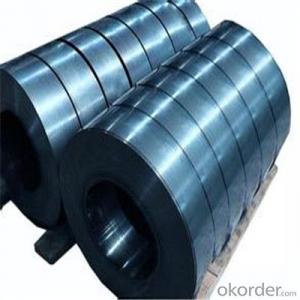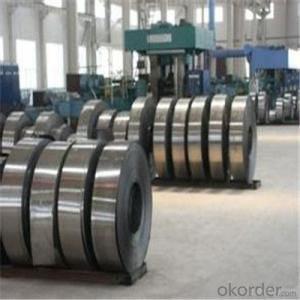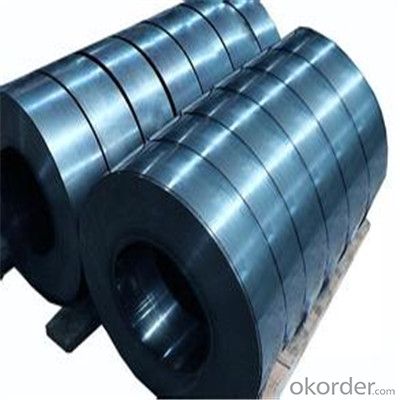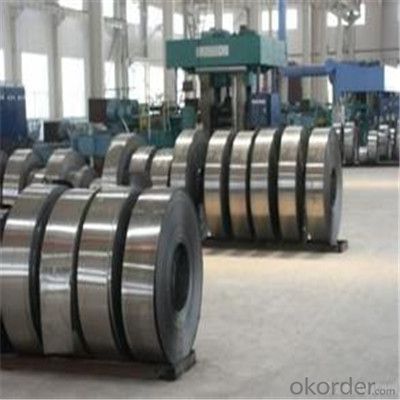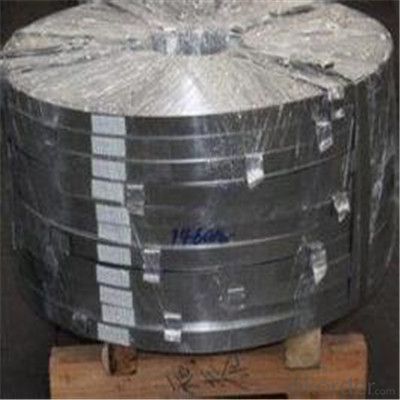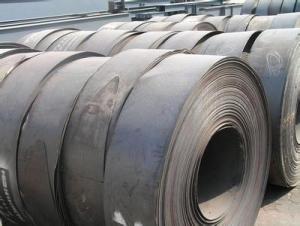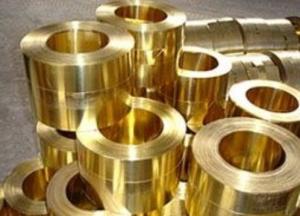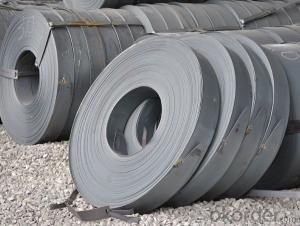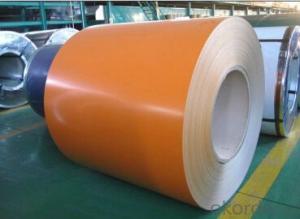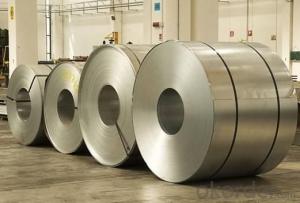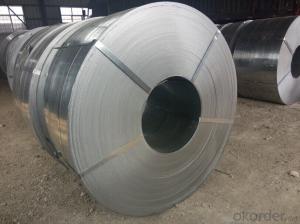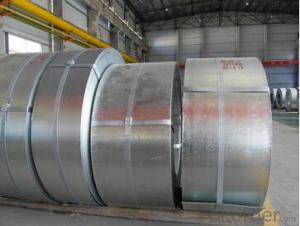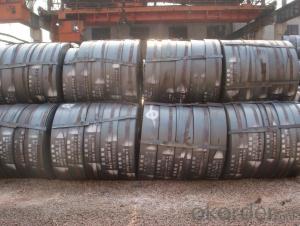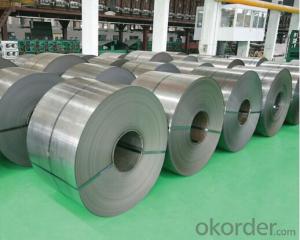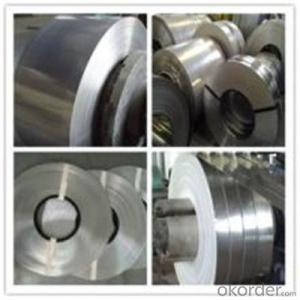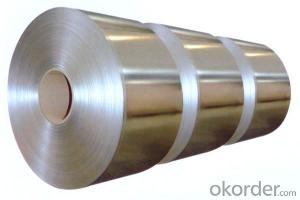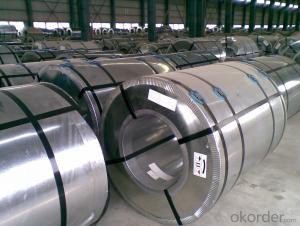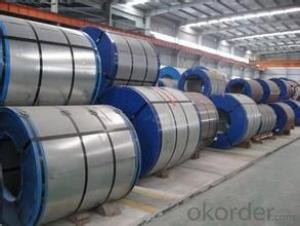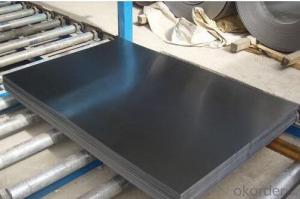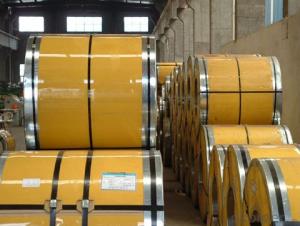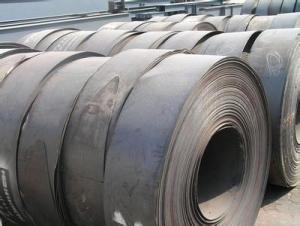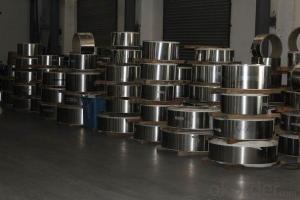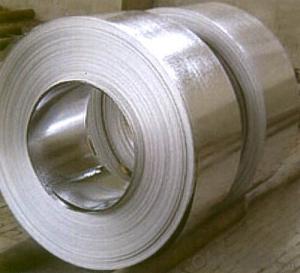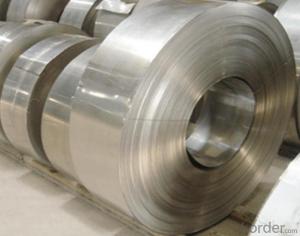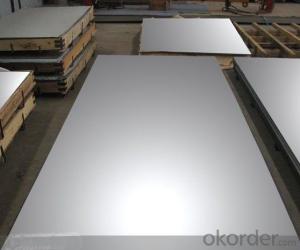Cold Rolled Steel Strip Coils in Various Materials from China
- Loading Port:
- Qingdao
- Payment Terms:
- TT OR LC
- Min Order Qty:
- 66 m.t.
- Supply Capability:
- 1222665 m.t./month
OKorder Service Pledge
OKorder Financial Service
You Might Also Like
Specification
Description of Steel Strip Coils:
Steel strips is one of our main products that is widely used in making band saw blade & other blades to cut paper, weed, etc.
Festures of Steel Strip Coils:
1.Thickness: 0.14-3.0mm
2.width:30-600mm
3.zinc coating: 30-275g
4.material:Q195, Q235,SGCC, A653 CS-B, DX51D,SGCD,SGHC,S350GD,S450GD,S550GD
5.spangle: zero spangle, regular spangle, small spangle
6.surface treatment: chromated and oiled, chromated and non-oiled
7.packing: export standard packing
8.Payment: TT or L/C
9.MOQ: 25TON
10.coil weight: 3-4ton
11.quality: soft or hard quality
Specifications of Steel Strip Coils:
1)Material:SPCC,SPHC,Q195,Q235,Q345,Q345B
2)Thick:0.15-3.0mm
3)Width:30-700mm
4)Zinc coating:Z6 to Z27(60g/m2 to 275g/m2, double sides)
5)Surface condition:Regular spangle
6)Coil ID:508mm
7)Coil OD:1000~1500mm
8)Packaging Detail: Export standard package,with PVC,steel cover.
9)productive capacity:6500tons per month
Images of Steel Strip Coils:
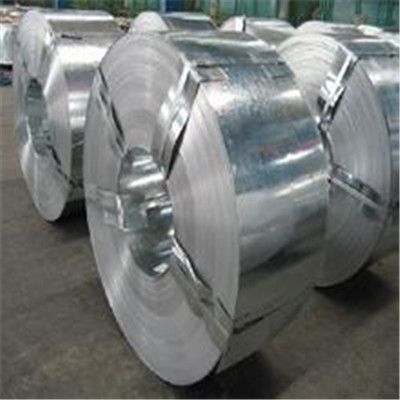
FAQ
1.What's your MOQ?
25MT, it is for one container.
2.Do you have QC teams?
Yeah, sure, our QC team is very important, they will keep the quality control for our products.
3. What's your normal delivery time?
Our delivery time about 10-20days for standard sizes, if you have other requirements like hardness and width ,it is about 20-40days.
- Q: What are the tolerances for dimensional accuracy of steel strips?
- The dimensional accuracy tolerances of steel strips can vary depending on specific requirements and industry standards. However, in general, the tolerances for dimensional accuracy of steel strips are typically determined by the strip's thickness, width, and length. Regarding thickness, the tolerance is usually specified as either a range or a maximum allowable deviation from the desired thickness. This tolerance can be expressed as a percentage or an absolute value, depending on the application. For instance, a common thickness tolerance for steel strips may be ± 0.05mm or ± 5% of the desired thickness. Similarly, the width tolerance for steel strips is typically specified as a range or a maximum allowable deviation. This tolerance ensures that the strip falls within acceptable width limits. For example, a typical width tolerance for steel strips could be ± 0.1mm or ± 1% of the desired width. The tolerance for the length of steel strips is often specified as a maximum allowable deviation from the desired length. This tolerance ensures that the strip remains within acceptable length limits. For instance, a common length tolerance for steel strips might be ± 1mm or ± 0.5% of the desired length. It is important to note that these tolerances can vary depending on the specific application, industry standards, and customer requirements. Various industries, such as automotive, construction, or manufacturing, may have their own unique tolerances for dimensional accuracy of steel strips. Therefore, consulting relevant industry standards or customer specifications is crucial to determine the precise tolerances required for a specific application.
- Q: What is the thickness range for steel strips?
- The thickness of steel strips can vary depending on the specific application and industry requirements. Typically, steel strips can range in thickness from a few millimeters to several centimeters. However, it is important to note that there are different types of steel strips, including hot-rolled, cold-rolled, and galvanized, each with their own specific thickness ranges. For instance, hot-rolled steel strips usually have a thickness range of 1.5 to 25 millimeters, whereas cold-rolled steel strips can range from 0.05 to 4 millimeters in thickness. Moreover, the thickness range can also be influenced by the manufacturing process and intended use of the steel strips. To obtain more specific information about the thickness range for a particular type of steel strip, it is advisable to consult industry standards, specifications, or get in touch with a steel manufacturer.
- Q: Are steel strips suitable for making fasteners?
- Yes, steel strips are suitable for making fasteners. Steel strips have high tensile strength and excellent durability, making them ideal for creating fasteners that can withstand heavy loads and provide strong and secure connections. Additionally, steel strips can be easily formed into various shapes and sizes, allowing for the production of a wide range of fasteners to meet different application requirements.
- Q: Are steel strips used in the production of automotive body panels?
- Steel strips are commonly employed in the manufacturing of automotive body panels. The automotive industry extensively utilizes steel due to its robustness, longevity, and cost-effectiveness. Essentially, steel strips are utilized to construct the fundamental framework of various body panels, such as the roof, doors, fenders, and hood. These strips are frequently shaped and fused together to achieve the desired panel configuration. Furthermore, steel strips offer exceptional safeguarding against collisions and contribute to upholding the structural stability of the vehicle. Nevertheless, with the progression of technology, alternative materials like aluminum and carbon fiber are also finding their way into the fabrication of automotive body panels owing to their reduced weight and enhanced fuel efficiency.
- Q: Can steel strips be formed into complex shapes?
- Yes, steel strips can be formed into complex shapes through various processes such as bending, rolling, stamping, and forming. Steel is a versatile material that can be manipulated to take on different shapes and sizes based on the requirements of a specific application. By using specialized tools and machinery, steel strips can be bent, curved, twisted, and shaped into intricate and complex designs. These formed steel strips are widely used in industries like automotive, aerospace, construction, and manufacturing, where complex shapes are often needed for various components and structures. The ability of steel strips to be formed into complex shapes makes them a valuable resource in modern engineering and design.
- Q: Are steel strips commonly used in the manufacturing of packaging materials?
- Yes, steel strips are commonly used in the manufacturing of packaging materials. They provide strength, durability, and stability to the packaging, making it suitable for transporting and storing various products.
- Q: What are the common thickness ranges for steel strips?
- The common thickness ranges for steel strips can vary depending on the specific application and industry requirements. However, in general, steel strips can be found in thicknesses ranging from as thin as 0.001 inches (0.0254 mm) to as thick as 0.25 inches (6.35 mm). These thickness ranges are commonly used in various industries such as automotive, construction, manufacturing, and aerospace. The specific thickness required would depend on factors such as the intended use, strength requirements, and the manufacturing process involved. Different thicknesses of steel strips offer different levels of flexibility, strength, and durability, allowing for a wide range of applications across various industries.
- Q: What are the common surface defect inspection methods for steel strips?
- There are several common surface defect inspection methods that are widely used for steel strips. 1. Visual Inspection: This is the simplest and most basic method of surface defect inspection. It involves a trained inspector visually examining the steel strips for any visible defects such as scratches, dents, cracks, or discoloration. While this method is subjective and relies on the inspector's skills and experience, it can still be effective for identifying major defects. 2. Magnetic Particle Inspection (MPI): MPI is a non-destructive testing method that uses magnetic particles to detect surface defects in steel strips. The steel strip is magnetized, and magnetic particles are applied to the surface. Any defects, such as cracks or discontinuities, will cause the magnetic particles to gather at these locations, making them visible to the inspector. 3. Ultrasonic Testing (UT): UT is another non-destructive testing method commonly used for inspecting steel strips. It involves the use of high-frequency sound waves that are transmitted into the steel strip. Any defects or discontinuities in the material will cause the sound waves to bounce back, creating echoes that can be detected and analyzed to identify surface defects. 4. Eddy Current Testing (ECT): ECT is a non-destructive testing method that uses electromagnetic induction to detect surface defects in conductive materials like steel. A coil carrying an alternating current is placed near the surface of the steel strip, creating eddy currents in the material. Any defects or changes in the material's conductivity will cause a variation in the eddy currents, which can be detected and analyzed to identify surface defects. 5. X-ray Inspection: X-ray inspection is a method that uses X-rays to detect surface and internal defects in steel strips. X-rays can penetrate the material and create an image of its internal structure. This method is particularly useful for detecting internal defects such as voids, inclusions, or delaminations that may not be visible by visual inspection. These are some of the common surface defect inspection methods used for steel strips. The choice of method depends on factors such as the type and size of defects, the required sensitivity, and the cost-effectiveness of the inspection.
- Q: What are the different methods for painting steel strips?
- There are several different methods that can be used for painting steel strips, depending on the desired outcome and the specific requirements of the project. Some of the most common methods include: 1. Spray painting: This is one of the most popular and efficient methods for painting steel strips. It involves using a paint spray gun to evenly coat the surface of the steel with paint. This method allows for precise control over the application, resulting in a smooth and even finish. 2. Brush painting: Another commonly used method is brush painting, which involves using a paintbrush to apply the paint onto the steel strips. This method can be more time-consuming and may require multiple coats to achieve the desired level of coverage and finish. 3. Dip coating: Dip coating is a method in which the steel strips are immersed into a tank of paint or coating material. The strips are then removed and excess paint is allowed to drip off. This method is often used for coating large volumes of steel strips quickly and efficiently. 4. Electrostatic painting: Electrostatic painting involves applying an electric charge to the paint particles as they are sprayed onto the steel strips. The steel strips are grounded, which attracts the charged particles to the surface, resulting in a more even and controlled application. 5. Powder coating: Powder coating is a dry finishing process that involves applying a powdered paint to the steel strips. The strips are then heated, causing the powder to melt and form a durable and protective coating. This method is known for its durability and resistance to chipping and fading. 6. Roll coating: Roll coating is a method in which the steel strips are passed through a set of rollers that are coated with paint or coating material. The rollers evenly distribute the paint onto the surface of the strips, resulting in a consistent and uniform coating. It is important to consider factors such as the desired finish, durability, and efficiency when choosing the method for painting steel strips. The specific application and requirements of the project will ultimately determine which method is most suitable.
- Q: Can steel strips be used in the production of hydraulic systems?
- Steel strips are capable of being utilized in the production of hydraulic systems. Due to its remarkable strength and durability, steel is frequently employed in the manufacturing of hydraulic systems. The construction of numerous hydraulic system components, including cylinders, pistons, valves, and fittings, can be achieved using steel strips. By utilizing steel strips, these components can effectively endure the immense pressures and forces associated with hydraulic systems. Moreover, steel possesses resistance to corrosion and can withstand extreme temperature fluctuations, thereby rendering it a material of choice for hydraulic applications.
Send your message to us
Cold Rolled Steel Strip Coils in Various Materials from China
- Loading Port:
- Qingdao
- Payment Terms:
- TT OR LC
- Min Order Qty:
- 66 m.t.
- Supply Capability:
- 1222665 m.t./month
OKorder Service Pledge
OKorder Financial Service
Similar products
Hot products
Hot Searches
Related keywords
